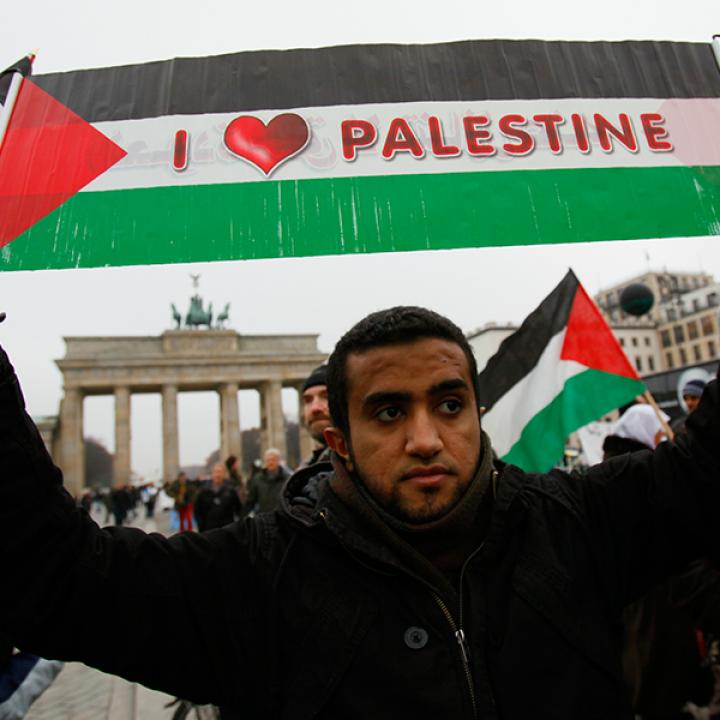
- Policy Analysis
- Fikra Forum
The Palestinian Public’s Tough Choices: On Violence, Instability, Hamas, “Jewish State”

One-third of West Bank and Gaza Palestinians want to “escalate the resistance against Israel, even if that makes life harder right now,” according to a late-May survey conducted by the reliable Palestine Center for Public Opinion. The majority, however, prefer other options: a compromise deal with Israel, a focus on daily life, or simply maintaining the status quo. The differences between West Bankers and Gazans are relatively modest, with the former slightly less inclined toward “resistance” and more inclined toward focusing on practical everyday issues. The chart below provides more details on these views:
“Now, in the short run, there are different views about the approach Palestinians should take toward Israel these days. I will read you four different ideas about that, and please tell me, which one comes closest to your own view:”
|
Different Views |
West Bank | Gaza |
|---|---|---|
| Palestinians should escalate the resistance against Israel, even if that makes life harder right now. | 29.5% | 34.2% |
| Palestinian should negotiate the best political deal they can with Israel, even if that requires some concessions. | 25% | 30.2% |
| Palestinians should focus more on practical issues of daily life, even if that leaves political problems unsolved. | 25.4% | 17.7% |
| The current situation is preferable to any of those other options, even if things are not great right now. | 16.9% | 13.1% |
| No opinion | 3.3% | 4.8% |
While this chart demonstrates that a substantial minority supports escalated “resistance,” other findings temper that view. Significantly fewer, less than 20 percent, want Hamas to break its cease-fire with Israel. And even smaller proportions feel “strongly” that the Palestinian Authority (PA) should continue to pay bonuses to prisoners “based on their sentences or armed operations”: a mere 7 percent of West Bankers, and 12 percent of Gazans.
Palestinian attitudes are also very mixed about their own prospects for stability or instability “in the next few years.” Among West Bankers, just 15 percent think “the PA will remain in power more or less as now.” More foresee local leaders taking control (25 percent), Hamas greatly strengthened (20 percent), or even “real anarchy” (18 percent) in the West Bank. But only a small minority (14 percent) expects that Israel will take over more control. Gazans are twice as likely as West Bankers to predict continued PA control – yet that is a minority view in Gaza too, at 31 percent.
These expectations are in line with the PA’s overall loss of popularity and legitimacy, as documented in other surveys. In this survey, although only a small minority identify with Hamas in either the West Bank or Gaza, two-thirds in each territory say “the PA should allow Hamas to operate politically, openly and freely, in the West Bank.” (Twenty-eight percent of Gazans, but only half as many West Bankers, feel strongly that way.) These figures are almost unchanged since the previous poll, exactly two years ago. At the same time, views about the rejectionist ideology of Hamas reflect a complex and changing mixture. Surprisingly, a solid majority now say that Hamas should “stop calling for Israel’s destruction, and instead accept a two-state solution based on the 1967 borders.” But for some, this would appear to be just a tactical measure.
In both places, there has been a modest decline since 2015 in the proportion who would accept “the principle of two states for two peoples, the Palestinian people and the Jewish people” – even if that “might help to end the occupation.” The figures today are 45 percent in the West Bank, and 37 percent in Gaza. Still, that formulation does get much higher support than recognition of Israel as a “Jewish state” – which registers barely in double digits, at 11 percent in the West Bank and 7 percent in Gaza. In addition, a substantial minority select this agnostic or “indifferent” position: “As long as an independent Palestinian state is established, I wouldn’t care what Israel is called.” The figures for that option are 28 percent in the West Bank, and 19 percent in Gaza.
What does all this mean for U.S. policy? The preceding analysis suggests three ways to take Palestinian public opinion properly into consideration. First, stand firm about rejecting both Hamas ideological rejectionism and any form of actual violence or “armed resistance,” both of which have only minority popular support. Second, once that prerequisite is fulfilled, concentrate on the majority Palestinian desire for stability, practical improvements in daily life, and a compromise deal with Israel – precisely in order to avert the dangers to all parties of the anarchy, fragmentation, or Hamas takeover of the West Bank that so many Palestinians predict. And third, in seeking a compromise deal, look for acceptable diplomatic formulas that reduce polarization and garner greater public appeal: for example, recognition of Israel as the state for the Jewish people, rather than “the Jewish state.”

